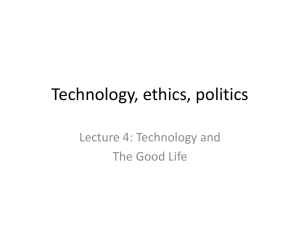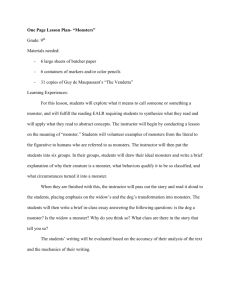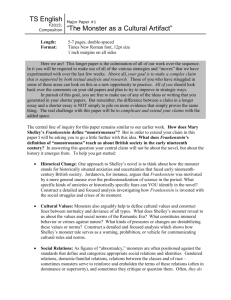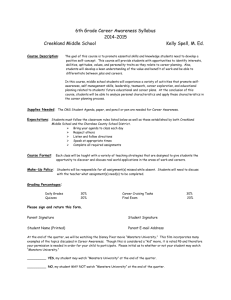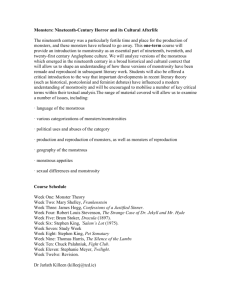Reading Monsters (Sample Syllabus)
advertisement
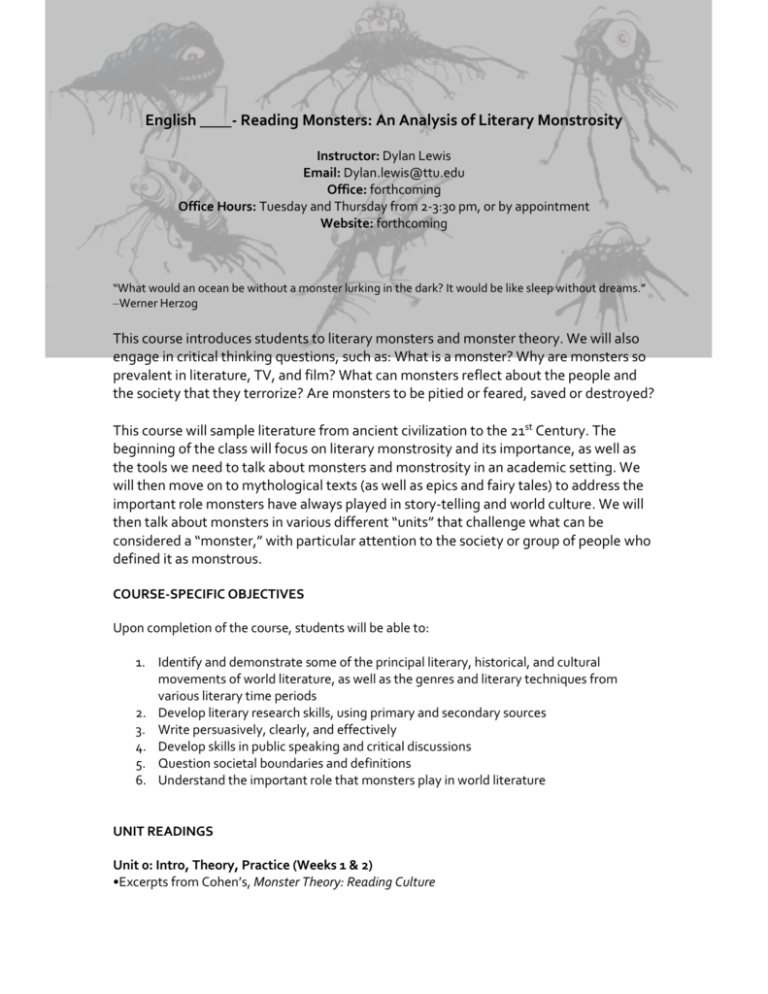
English ____- Reading Monsters: An Analysis of Literary Monstrosity Instructor: Dylan Lewis Email: Dylan.lewis@ttu.edu Office: forthcoming Office Hours: Tuesday and Thursday from 2-3:30 pm, or by appointment Website: forthcoming “What would an ocean be without a monster lurking in the dark? It would be like sleep without dreams.” –Werner Herzog This course introduces students to literary monsters and monster theory. We will also engage in critical thinking questions, such as: What is a monster? Why are monsters so prevalent in literature, TV, and film? What can monsters reflect about the people and the society that they terrorize? Are monsters to be pitied or feared, saved or destroyed? This course will sample literature from ancient civilization to the 21st Century. The beginning of the class will focus on literary monstrosity and its importance, as well as the tools we need to talk about monsters and monstrosity in an academic setting. We will then move on to mythological texts (as well as epics and fairy tales) to address the important role monsters have always played in story-telling and world culture. We will then talk about monsters in various different “units” that challenge what can be considered a “monster,” with particular attention to the society or group of people who defined it as monstrous. COURSE-SPECIFIC OBJECTIVES Upon completion of the course, students will be able to: 1. Identify and demonstrate some of the principal literary, historical, and cultural movements of world literature, as well as the genres and literary techniques from various literary time periods 2. Develop literary research skills, using primary and secondary sources 3. Write persuasively, clearly, and effectively 4. Develop skills in public speaking and critical discussions 5. Question societal boundaries and definitions 6. Understand the important role that monsters play in world literature UNIT READINGS Unit 0: Intro, Theory, Practice (Weeks 1 & 2) •Excerpts from Cohen’s, Monster Theory: Reading Culture •**Mittman’s “The Impact of Monsters and Monster Studies” •**Donovan’s, “Why we create monsters” •**Trout’s, “Why we invented monsters: How our primate ancestors shaped our obsession with terrifying creatures” Unit 1: The Origins (Week 2) •**Excerpts from Homer’s, “The Odyssey” •**Excerpts from the Grimm Brother’s Kinder und Hausmärchen (with English trans.) •**Excerpts from “Beowulf” •**Excerpts from “Liber Monstrorum” Unit 2: The Horrific Monster (Weeks 3 & 4) •Bram Stoker, Dracula •**Lovecraft, “The Dunwich Horror,” “The Outsider,” & “The Call of Cthulhu” Unit 3: The Paternal Monster (Weeks 5 & 6) •**Bates’, “Is Father-Son Conflict Inevitable?” •**Franz Kafka, “Das Urteil” (“The Judgment”) •Stephen King, The Shining Unit 4: The Scientific Monster (Weeks 7 & 8) •Mary Shelley, Frankenstein •R. L. Stevenson, The Strange Case of Dr. Jekyll & Mr. Hyde •**Film, Jurassic Park Unit 5: The Political Monster (Weeks 9 & 10) •**Excerpts from war propaganda posters •George Orwell, 1984 •**Film, Invasion of the Body Snatchers Unit 6: The Human Monster (Weeks 11 & 12) •**Wong’s, “5 Reasons Humanity Desperately Wants Monsters to Be Real” •**Edgar Allan Poe, “The Tell-Tale Heart” • Bret Easton Ellis, American Psycho **Electronic or print copies will be provided. ASSIGNMENTS •Participation: 10% in-class discussion, quizzes, in-class writing, & forum posts •Favorite Monster Presentation: 15% •Discussion Leader: 20% •Three Short Essays: 30% (3 @ 10%) 3-5 pages •Term Paper Proposal: 5% • Term Paper: 20% 5-8 pages with a minimum of 2 scholarly/external sources **Extra credit can be earned by attending movie showings that will be held outside of class for Dracula, Frankenstein, and The Shining. Mere attendance is not enough to fulfill the extra-credit. Students must also write a one-page summary about the text-to-film differences, focusing on the monster’s portrayal. This extra-credit will add a total of 3% to your Term Paper grade (1% per movie write-up). REGULATIONS Minimum Work Requirement: Students must complete every major assignment (essays, presentations, and “Discussion Leader”) in order to be eligible to pass the class. Attendance: Attendance will not be taken; however, failure to attend class will result in the lowering of a student’s participation grade. Students are also expected to turn in a physical copy of all work by its announced due date (usually at the beginning of class that day). No late work will be accepted for major assignments without a university-approved excuse. Grading Scale: A = 100-90 B = 89-80 C = 79-70 D = 69-63 F = 62 or below If you miss a class... Find out from a classmate what was covered in class and check on website to see if you missed any minor assignments or if there were any announcements. Ask if you can borrow notes. Please do not email your instructor asking if you missed anything important or to request the class lecture. Class is always important. It is your responsibility to catch up. If there is a minor assignment due on a day that you cannot attend class, you can always email the assignment. As long as it comes in by 5pm (and is a minor assignment) it will be accepted. Participation: Participation includes substantive and regular contributions to class discussions, as well as completion of any homework, in-class assignments or quizzes. Student should also have completed readings prior to class and be prepared to discuss the week’s assigned text(s). Simply coming to class is not enough; however, because I understand that it is sometimes awkward or embarrassing to speak up in class, students may contribute written forum posts on the class website to supplement class participation. This does not exclude you from answering when specifically called on. To foster productive discussion, students should: Read all assigned texts prior to the class when we are scheduled to look at the work. Attend class Thoughtfully and critically engage and participate in class discussions Prepare all assignments according to the guidelines the instructor provides. Plan your schedule accordingly so you can keep up with course work. You never know when you may walk into a class and find you have a surprise quiz. Frame questions and differences of opinion in a constructive and polite manner. Respect the rights of each student and of the instructor to speak without having to talk over other voices. Treat your classmates and the instructor with respect and courtesy. Discrimination or rude behavior of any kind will not be tolerated. Assignment Format: All essays and assignments must follow the MLA style manual. This information can be accessed using the University Writing Center resources page (http://uwc.ttu.edu/Resources/default.asp) or the Purdue Online Writing Lab (http://owl.english.purdue.edu/owl/resource/747/01/). Assignments must be typed and doublespaced, and must include your name, course number, and date in the upper left- hand corner of the first page. If citation is required, it must be in MLA format. Also see the MLA handout sheet on the website. Emailed assignments must conform to file naming protocol. Unless stated otherwise, homework and essays will be turned in as a physical copy. Drop Deadlines: It is the student’s responsibility to learn when the drop deadlines are scheduled each semester.

